
This article aims to shed light on the corruption within the US food industry, focusing on adulterated products, harmful additives, and their detrimental effects on public health. We will explore the practices that encourage these issues to continue, their consequences and consumers’ crucial role in addressing this problem.
What is Corruption?
Corruption is the abuse and misuse of endowed power for private gain. Corruption destroys trust and credibility. However, corruption is one of the most used ways to create more profit within businesses, companies, organizations, and industries. Corruption takes place in many forms: food industries in America take part in a type of corruption known as food fraud, seen with the continuous selling of adulterated food products.
Adulteration
Adulteration is when a component of a product is altered, but that alteration is not acknowledged. For example, a company might sell their product labeled as honey when, in reality, that “honey” was altered with a substance like corn syrup or sugar cane. The adulteration of food products takes away the authenticity of the product. Instead of using natural substances secreted from the honeycomb, industries would use modified sugars posed as “all real, natural ingredients.”
The Purpose of the US Food Industry
American food industries have been established to oversee the processing, packaging, and distribution of goods from raw agriculture to consumer food products. Almost 20% of America’s economy relies on the American Food Industries, which are accountable for more than “$8.6 trillion” of the US’s economic activity (Klobuchar). This makes the food industry prominent in America because of profitable gains. The American food industries also play a vital role for citizens, supplying employment for millions of Americans.
The FDA’s Role
The FDA also plays an essential role in American food industries as it regulates what is considered safe and unsafe for consumers. FDA’s Center for Food Safety and Applied Nutrition (CFSAN) is in charge of the majority of food regulations. The FDA safeguards the food supply by assessing the use of chemical ingredients in food. The FDA also evaluates any substances that come into proximity with food through food packaging processes, storage, and other types of food handling. The FDA knows when a product is considered unsafe for consumption, but because the food industry is all about what is profitable, the FDA doesn’t utilize its authority to stop harmful chemicals from being added to our food. The FDA also pays no heed to the adulteration processes within the American food industry because of the lucrative outcome these food products generate.
Consumer Awareness
As mentioned before, one of the main reasons for corruption in the American food industry is because of adulterated products. The US food industries don’t tell their consumers that many of the foods Americans consume contain “trifecta of triggering substances.” These trifecta-triggering substances tend to lighten up the reward center in our brains (dopamine), causing consumers to become addicted to the products. These substances make consumers return and buy more of the product, ultimately making the item more profitable. However, the food industry’s profits are at the expense of the public’s health. Food industries are so money-hungry that they prioritize their revenue over their consumers’ well-being by incorporating lethal chemicals like the trifecta-triggering substances into the American diet and calling it “food.” These trifecta-triggering substances are refined sugar, trans fats, and chemical additives. Here is a little breakdown of what these trifecta-triggering substances are and how these substances are harmful to the consumer’s health:
Sugar
The sugars used in the foods Americans consume are 9 out of 10 times refined. Refined sugar is concentrated and extracted from their natural source, usually added to foods and beverages to improve taste. Refined sugars are of no nutritional value as they do not contain vitamins, minerals, proteins, fibers, fats, or any other beneficial compound to benefit a person’s health. Instead, these refined sugars promote “higher blood pressure, inflammation, weight gain, diabetes, and fatty liver disease, increased risk of heart attack [as well as] strokes” (Harvard Health). Some examples of refined sugars include white sugar, certain brown sugars, coconut sugar, palm sugar, and high-fructose corn syrup.
Trans Fats
Trans fat, also known as “trans-fatty acid,” is considered one of the worst fats to eat but is commonly found in our foods. Unlike other dietary fats, trans fats increase “bad” cholesterol levels and decrease “good” cholesterol levels. Trans fats increase cancer risks as well as heart disease risks, which happen to be the leading killer of adults. Trans fats overall contribute to many premature deaths within America, yet it’s still packaged and distributed with the rest of the toxic chemicals labeled as “food.”
Chemical Food additives
Too many food companies also use Monosodium Glutamate (MSG), which helps enhance the flavor of poor-tasting, poor-quality foods packaged, labeled, and sold in everyday supermarkets. MSG is a very convenient chemical to add to food products as it suppresses appetite satisfaction. In other words, MSG allows consumers to buy and eat way more food than a “healthy portion.” Apart from MSG being a flavor enhancer, MSG is also connected to various forms of toxicity, such as: “obesity, metabolic disorders […], neurotoxic effects and ruinous effects on the reproductive organs” (Kamal).
Food additives are known as metabolic disruptors. Food additives are chemicals that may cause diabetes, brain damage, cancer, and other health issues. Examples of metabolic disruptors would include sodium nitrite, shortening products, hydrogenated oils (found in the majority of margarine products, baked cookies, and crackers), high fructose corn syrup (seen in the majority of soft drinks), monosodium glutamate (“a proven excitotoxin”), aspartame (found in a lot of diet foods and drinks), homogenized milk fats and other similar ingredients.
Unfortunately, most chemically induced foods, meaning they contain trifecta-triggering ingredients, are promoted and sold by food industries in America. The food industries aren’t concerned if chemicals in their products cause underlying health conditions for their consumers. The food industry is mainly worried about whether their items sell well. The corruption in this industry is evident, and as long as processed foods continue to sell as big hits and grow in popularity, food industries aren’t going to prevent their consumers from eating the harmful chemicals put in their products. More often than not, the side effects of these health-challenging chemicals in processed foods aren’t listed. Instead, these products are encouraged as “healthy options” made with “minute” amounts of harsh chemicals and additives, all false statements. The corruption in American food industries will not cease unless consumers speak up and advocate for their health. The least food industries could consider doing is just being transparent with their consumers about their practices, as consumers trust that their products are safe. Consumers should be able to trust where their food is coming from and not have to question whether or not they are about to put poison in their bodies. It is of great importance that consumers can make informed choices on what is good to eat and what is not. It’s up to the consumers to care about their health and express the need for changes to end this lawlessness in the food industry.



































